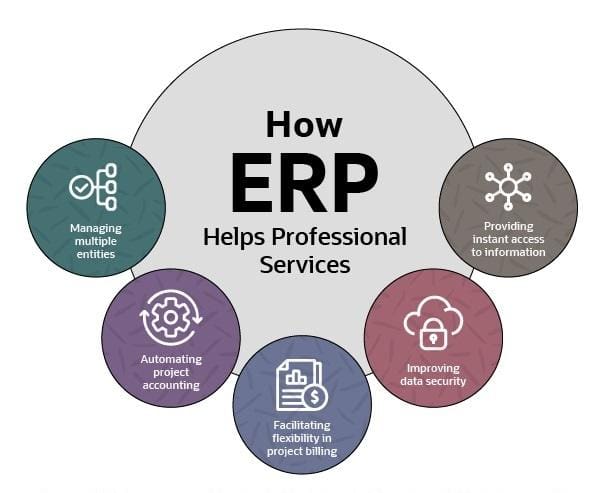For all intents and purposes, most professional services firms are custom businesses. Because services firms provide expertise rather than tangible products, they can — and often do — offer an ever-expanding menu of service options that can be combined in almost limitless ways to meet the very specific needs of their clients. Law firms, management consultants and accounting firms are all examples of companies that can literally create a product — say, consulting on a hot new technology or important regulation — in minutes to respond to client demands.
Enterprise resource planning (ERP) systems have emerged as a powerful solution to help the professional services industry integrate and streamline operations across the enterprise, reducing manual data entry while increasing the efficiency of financial management, project management, resource allocation and client communication. In fact, small and midsize businesses, including professional services firms, are expected to experience the largest growth in ERP market size (12%) during the next 10 years, according to Acumen Research and Consulting.
What Is ERP for Professional Services?
Professional services ERP systems are purpose-built for the specific needs of the industry, such as accounting or law firms, which often sell expertise rather than physical products. Professional services ERP systems boast specific capabilities to help companies that primarily deliver project-based services tailored to a core group of clients. Examples are tracking billable hours, client management and ensuring seamless client communication. In addition to having industry-specific capabilities, professional services ERP systems offer the same core features of ERP systems built for other industries. These include a unified database in which to consolidate companywide data across finance, CRM and HR activities that companies can use to automate processes and build a holistic view of operations.
Key Takeaways
- Professional services business models focus on offering expertise in project-based engagements for a wide array of often diverse clients that frequently demand highly customized solutions.
- This often creates complex operational challenges for managing time, resources, budgets and client communication.
- ERP systems, which began as manufacturing-centric solutions in the late 1990s, have evolved to offer capabilities to address the specific operational challenges professional services firms face.
- Professional services ERP systems streamline operations by combining powerful features for enhanced project management, comprehensive financial management, time and expense tracking, resource allocation and optimization, CRM and data-driven decision-making in one solution.
- When selecting an ERP solution, professional services firms should look for industry-specific capabilities, scalability, customizability and strong customer support features.
ERP for Professional Services Explained
In the late 1990s, the first ERP systems emerged to help manufacturers with specific needs, such as inventory management, production and procurement. As a result, early ERP systems were primarily viewed as manufacturing-centric solutions to consolidate data and streamline organizational processes. As the popularity of ERP systems grew, however, so did the need to tailor the technology to the specific needs of different industries, such as professional services firms.
For example, professional services firms are often project-based, as opposed to product-driven, which means they generally need more advanced resource allocation capabilities to match resources with tasks. Professional services firms also often have complex billing structures, such as fixed-price, time-and-materials and milestone-based billing, which require specific revenue-recognition models.
Why Professional Services Need ERP
Unlike manufacturing companies, which may offer only a handful of distinct products, many professional services firms offer a complex array of project-based services, often custom-designed to meet the needs of a growing list of diverse clients. As a result, professional services firms need to manage an intricate maze of project deliverables, resources and billing models. Using stand-alone systems to manage each of these activities poses a host of challenges. For example, if project data is stored in a project management system and expenses in a financial application, professional services firms may struggle to match client activities and expenses for accurate monthly billing.
ERP systems excel at reducing the complexity inherent in professional services business models by consolidating data and workflows across operational activities, such as finance, customer management, HR and project management. With all data consolidated in a single database, companies can reduce complexity while also dramatically improving data accuracy and operational efficiency. For example, a project management module in an ERP system can use data from an integrated financial module to ensure that projects remain on budget. Similarly, an ERP system can use data from an integrated HR system to precisely match the right skills with appropriate projects.
How ERP Helps Professional Services
An ERP system’s consolidated database across operational activities, such as finance, HR and project management, is good news for professional services firms, which often need to blend project activities, resources, timelines and budgets into multiple tailor-made solutions for almost every client. The following five core ERP capabilities can make processes and workflows dramatically simpler, more accurate and efficient.

Managing Multiple Entities
For professional services firms, especially those with a global reach or diversified services, juggling multiple entities, such as branches, departments and distinct business units, can be daunting. Each likely has its own financial processes, operations and unique challenges. Differences in currencies, regulations, local business practices and cultural nuances can pose significant operational hurdles that, if not managed efficiently, can lead to financial discrepancies, regulatory breaches or reputational damage.
Professional services ERP systems unify disparate entities on a single platform with features that cater to the unique challenges of multi-entity management. For example, automated currency conversions and region-specific regulatory compliance modules can consolidate financial statements, ensuring that decision-makers have a holistic view of performance. In addition, ERP systems can streamline inter-entity billing and resource-sharing, making internal operations run more smoothly.
Automating Project Accounting
Professional services firms often deliver services in tailor-made projects, each with its own budget, requiring precise project accounting. It’s not uncommon for clients to have multiple projects in motion at the same time. Multiply that by a complete client base, and it’s easy to see why project accounting is such a challenge. Picture a global consultancy with a project that spans multiple countries, currencies, tax regulations and subcontractors. Each element needs to be reconciled, preferably in real time, to avoid mismatched expenses, billing discrepancies and compliance issues that can affect profitability and client trust.
ERP systems can automate gathering financial data from various sources, such as billing, expenses, taxation and currency exchanges, into a unified, real-time database to ensure that financial records are always up-to-date, compliant and ready for any audits or reviews. For example, an ERP system can automatically convert currencies, factor in regional tax variations and allocate overhead costs proportionately across projects.
Facilitating Flexibility in Project Billing
Unlike traditional, product-centric businesses, professional services firms grapple with often complex billing methods, ranging from hourly engagements to fixed-rate contracts and value-based billing. In many instances, a client’s billing method shifts as the relationship evolves, perhaps starting with a fixed monthly arrangement and then moving to a time- and material-based engagement as needs expand. Firms that don’t have the systems to support flexible project-billing structures will likely miss business opportunities or face disgruntled clients that demand diverse billing options.
ERP systems enable professional services firms to configure multiple billing rates, intervals and structures, as well as track project hours, expenses and other billable items in real time. The result is improved billing transparency and accuracy. Automated billing processes also ensure that invoices are generated and sent according to client preferences, such as monthly or upon reaching certain milestones. Finally, with integrated financial management modules, professional services ERP systems seamlessly synchronize billing data with financial ledgers, guaranteeing real-time revenue recognition.
Improving Data Security
Like many companies, professional services firms need to secure their confidential data — from intellectual property to strategic plans and financial information. And because they often have many clients, they’re also responsible for maintaining confidential client information. Any compromise in client data integrity can have disastrous consequences, including financial losses and, more critically, irreversible damage to reputation.
Professional services ERP systems offer a holistic security solution by centralizing data storage, which reduces the attack surface for data breaches. Also, comprehensive ERP systems often come with additional security features, such as advanced encryption methods, multifactor authentication and role-based access controls to ensure that employees access only the data that’s relevant to their job functions. Some ERP systems also facilitate regular security audits and have real-time monitoring to detect and quickly respond to anomalies.
Providing Instant Access to Information
Professional services firms often navigate tight schedules, client meetings and deliverables with extremely short deadlines. With the dynamic nature of their client engagements and the urgency to respond to changes or queries, delays in accessing accurate information can result in missed opportunities and dissatisfied clients. Unfortunately, if important data resides in multiple disconnected systems, professional services firms will struggle to respond quickly and accurately.
ERP systems address data fragmentation by consolidating information from disparate departments and projects to ensure that the necessary information is just a few clicks away, regardless of where it originates. An ERP system’s unified database enables real-time data synchronization across finance, HR, CRM and project management modules so that all stakeholders have access to the latest information. For example, a manager could pull up a project’s current financial standing, understand resource allocation, view client feedback and monitor project milestones all within the same system, expediting decision-making and enhancing client engagement. In a 2022 study of accounting firms by Wolters Kluwer, 73% of respondents said technology is helping improve average client response time.
Benefits of ERP for Professional Services
Professional services project engagements often involve an ever-shifting combination of companywide resources that continuously adapt to new assignments, requirements, time frames and budgets. The following benefits of ERP systems make it possible for firms to stay completely up-to-date with shifting priorities, ensuring that internal processes and resources operate smoothly, costs are accurately tracked and billed, and client needs are met.
Streamlined Operations
Professional services firms offer expertise as their primary product, which means time management, rapid client response and precision insights are often equated with client satisfaction and revenue. Many professional services projects, however, involve a complex juggling act of shifting resource needs, detailed project timelines, multiple client interactions and diverse billing structures. Each project may vary in scope and requirements, only adding to the operational complexity. Without streamlined operations, firms often experience project delays, budget overruns or unhappy customers.
Professional services ERP systems integrate and automate a wide range of operational activities on a singular platform, unlocking operational efficiency. Real-time data synchronization across finance, HR and project management modules, for example, provides an accurate and current overview of operations. For example, a law firm handling multiple cases can use an ERP system to integrate finance for billing, HR for resource allocation and project management for case timelines, ensuring that every case is managed efficiently without overlap or delay.
Enhanced Project Management
Professional services firms often grapple with multiple moving parts — from managing client expectations and shifting deadlines to coordinating with external consultants and tracking billable hours. Such complexity requires enhanced project management skills to avoid project overruns, inflated costs, mismatched resource allocation and the potential loss of client trust.
ERP systems offer tools that provide the agility, transparency and coordination that professional services firms need to support successful project management. Features, such as real-time data entry, automated reminders and integrated modules for finance, HR and project management activities, can address the real-time collaboration, milestone tracking and budget challenges that professional services firms face. For instance, if a consulting firm is working on a multiphase project, an integrated ERP system can help schedule resources, track milestones, integrate financial data for invoicing and provide customer feedback, all in one system.
Improved Financial Management
Financial management poses a particular challenge for professional services firms, which often deal with multiple projects, contracts and clients concurrently. Each project can have its own financial intricacies, from fixed-rate contracts and hourly billing to milestone-based payments. With such diverse financial possibilities, managing profitability and cash flows and ensuring timely revenue recognition become daunting tasks. If not executed proficiently, these processes could present professional services firms with cash crunches, incorrect profit recognition or legal consequences from billing disputes.
ERP systems track project-based financials seamlessly, ensuring precise budgeting, timely invoicing, efficient cash flow management and real-time profit-and-loss analysis. Integrated ERP systems that consolidate finance, HR, CRM and project management data in a single database, for example, can provide a holistic view of a firm’s operations, which can be used to audit billable hours by employee, link hours with a client contract in the CRM system and automate billing.
Accurate Time and Expense Tracking
For professional services firms, the custom nature of each project can feel like launching a new product every week, each with its own budget requiring meticulous tracking of every hour and dollar spent. Without accurate tracking, companies can find themselves in a difficult situation. Underestimating hours can result in underbilling, directly impacting project profitability. Overestimating, on the other hand, can lead to client dissatisfaction or disputes.
Professional services ERP systems track time down to the minute and record every expense, whether it’s a substantial software procurement or a small stationery purchase. More importantly, an ERP system’s integrated modules connect the dots among project hours, expenses and budgets, providing not only a holistic view of project and client expenses, but also automated notifications when costs exceed preset limits.
Resource Allocation and Optimization
Juggling multiple clients and projects, each with frequently shifting timelines, budgets and skill requirements, means professional services firms need to put a premium on the careful distribution and use of resources. Client success depends on optimizing all available assets, including expertise, technology and time, to ensure that each project meets agreed-upon schedules, budgets and expectations. Imagine a law firm embroiled in multiple litigation cases, each demanding specific expertise and time commitments. Inaccurate resource allocation could spiral into unmet deadlines, overworked staff and client dissatisfaction.
ERP systems break down operational silos by delivering a consolidated view of resource availability, project timelines and client requirements. By intricately weaving these factors into a single unified system, ERP solutions not only provide a clear picture of resource availability, but also streamline allocation by aligning it with project requirements and profitability thresholds.
Enhanced Client Relationship Management
Each client interaction for a professional services firm isn’t simply a transaction, but a custom engagement tailored to specific needs and challenges. As a result, professional services firms are in a constant state of building strong, enduring relationships through impeccable service, adept problem resolution, clear communication and consistent alignment with client objectives and expectations.
ERP systems, with their holistic and integrated approach, serve as a unified hub for client interactions, service histories and communication threads that enable professional services firms to build interactions and services that are timely, personalized and insightful. ERP features, such as comprehensive client views, automated communication flows and predictive analytics, allow companies to get on the front foot with proactive, client-centric business models. By blending client requirements, project timelines and financial management activities into a unified strategy, ERP systems drive client satisfaction as well as enduring, value-driven relationships.
Data-Driven Decision-Making
Professional services engagements depend on an intricate understanding of client needs, market dynamics and internal operational capacities. Without the ability to sculpt, refine and act upon precise, real-time data to guide strategic decisions, professional services firms may find themselves grappling with inefficiencies, misaligned strategies and the gradual erosion of client trust and financial sustainability.
ERP systems integrate data from multiple connected systems, such as finance, HR and project management, to provide a unified, real-time actionable knowledge engine to enable firms to design robust, resilient and adaptive strategies. For example, an architectural firm using an ERP system can instantaneously align client requirements, resource availability, budgetary allocations and project timelines to design a strategic blueprint that meets client expectations and is grounded in operational, financial and resource realities.
Improved Collaboration
The custom nature of almost every client project for professional services firms mandates a deeply embedded collaborative spirit that spans departments, teams and organizational hierarchies. Maintaining a coordinated, client-centric approach requires seamlessly blending resources across distinct departments, such as finance, project teams, HR and client management, into a collaborative juggernaut that consistently meets client needs and expectations.
ERP systems can bridge departments within a firm, enabling real-time data access and fostering an environment where decisions and strategies are built with a holistic understanding of internal capabilities and external demands. For example, an ERP system can knit together the client management and project execution teams within a consultancy to ensure that client expectations are mapped to actionable plans, timelines and resource allocations, and avoid the consequences of overcommitment and underdelivery. ERP systems also create a unified data and communication platform to eliminate data silos and ensure that knowledge and insights flow seamlessly, building a culture in which strategies and decisions combine to reflect both client needs and organizational capacities.
Risk Management
Professional services projects are often varied and unpredictable from client to client, opening firms up to risks that can erode client trust and lead to financial setbacks. For example, tailor-made services elevate the risk of misaligned expectations and scope creep, which can create financial and reputational issues. Human capital risks are also greater at professional services firms, which often rely on intellectual capacity as a competitive differentiator, making executive departures, for instance, highly disruptive.
ERP systems help identify and analyze potential risks and develop strategies to navigate potential crises unscathed. A well-integrated ERP system, for example, can marry project management with financial planning to ensure that scope creep, resource misallocation or financial misjudgments are identified, analyzed and mitigated using strategies built with a clear understanding of both client expectations and organizational capabilities.
Scalability
Every new professional services project involves unique demands, varied client expectations and distinct operational challenges. As they grow, firms can find themselves caught in a whirlpool of operational, financial and client management complexities. In this environment, scalability is a balancing act where expanded growth in clientele, projects and market reach must be carefully measured against operational expertise, technology and talent — without sacrificing client relationships, expertise delivery and agility.
ERP systems provide a foundation of integrated data management, agile project management tools and incisive financial insights that equip firms with real-time insights, optimized talent management, financial accuracy and robust CRM to support and drive sustainable growth. ERP systems with integrated modules for finance, HR, CRM and project management, for example, allow companies to scale with their growth, adding new modules as capabilities increase. Cloud-based ERP systems also support growth by making it easier for companies to add storage or computing capacity in minutes to support new business units, for instance.
Regulatory Compliance
Professional services firms, especially those in legal, accounting and consulting, must often comply with important regulations, including, but not limited to, General Data Protection Regulation (GDPR) for data protection, Sarbanes-Oxley (SOX) for accounting and multiple industry-specific guidelines. Because professional services firms often handle sensitive financial and strategic information on behalf of clients, regulatory adherence is more than a legal obligation; it’s the foundation of client trust and operational integrity.
Given their regulatory requirements, professional services firms need ERP systems that seamlessly combine compliance with day-to-day operations across finance, HR, client management and more to mitigate risks and enhance operational efficiency. With their data management and real-time analytics capabilities, ERP systems allow firms to maintain detailed records, ensuring that every financial transaction, client interaction and project delivery adheres to regulatory guidelines — not as a disjointed compliance activity, but as an integrated operational functionality. For example, by automating data retention schedules, ensuring encrypted client communications and validating data accuracy, ERP systems strengthen a firm’s compliance posture and elevate client trust by uniting regulatory adherence with operational efficiency.
Data Security
In a business world already hyper-focused on data security, professional services firms need to be extra vigilant. That’s because, in addition to protecting their own sensitive data, they need to secure their clients’ critical multifaceted data, as well. Everything, from client-specific financial and strategic data to precise project details, requires varied access controls, monitoring and data handling procedures to avoid serious consequences. Security breaches have the potential to lead to reputational damage, client distrust and even legal consequences.
ERP systems can make it easier for professional services firms to reduce the potential for security breaches and mitigate their impact should they occur. Integrated ERP systems provide a unified data management protocol across diverse organizational units, eliminating data silos and ensuring consistent security methods across all key operational activities. Features, such as role-based access, data encryption and audit trails, let companies customize data access according to individual employee needs and then track data history to make it easier to identify the source of security issues. Finally, ERP systems can also provide automated alerts for suspicious activity to mitigate security risks before they become a problem.
Reduced Redundancy
It’s not uncommon for professional services firms to store project details, client communication and financial transactions in separate, disconnected systems. It might seem like a harmless practice, but, in reality, different departments inputting the same data differently in separate systems can create silos of redundant, often inconsistent data. This can lead to confusion, errors and miscommunication that can derail projects, damage client experiences and limit organizational insights.
Professional services ERP systems establish a single, unified database where every data input becomes a singular reference point for all departments and functionalities. As a result, updates to a client’s budget in an integrated ERP system, for example, become instantly accessible to finance, project management and client relations teams in real time.
Features to Look for in an ERP for Professional Services
The key to an effective ERP solution is integrated modules that work seamlessly across critical operational processes. The following core capabilities form the foundation of a strong professional services ERP solution.
Client Relationship Management
An ERP system for professional services must have client management capabilities at its core. Look for ERP systems with robust CRM modules featuring real-time data analytics, integrated communication tools and synchronized, integrated data across different organizational domains, including finance and HR. A seamless, unified platform connects customer interactions across departments to form a comprehensive view of the client journey that helps build, nurture and retain clients. For example, a CRM module in an ERP system could distill client communications, project status and financial data into a singular view. As a result, a project manager discussing timelines or changes with a client can have immediate access to past communications, ongoing project statuses and financial data, allowing for informed decision-making and coherent communication.
Project Management
Integrated ERP systems with project management capabilities, such as resource allocation and management, time-tracking and document management, offer a consolidated platform to ensure timely project delivery while also optimizing resources and maintaining fiscal health. Using an ERP system that integrates project management with other core operational activities, such as finance and HR, gives professional services firms control over diverse project elements, from client-specific resource needs to communication trails, budgets and billing. An ERP system synchronizes these disparate strands into a unified view, applying real-time data analytics for deep insights. For example, a marketing agency can use project management capabilities in an integrated ERP system to link client communication, project timelines and billing to ensure that client feedback is instantaneously reflected in timelines and invoices.
Financial Management
Client engagements at professional services firms often involve varied and intricate financial transactions with multiple billing methods, diverse expenditure types and multifaceted revenue streams resulting from almost limitless combinations of services. It’s a landscape that demands an ERP system that integrates financial management with other key operational departments, such as HR and project management, to not only track and manage transactions, but also translate them into actionable insights to tighten financial controls, optimize pricing strategies and resources and enhance profitability. For example, a seamless integration of financial and project management modules ensures that budget overruns are instantaneously flagged so that client engagements remain strategically and operationally sound, as well as financially viable.
Resource Management
The client- and project-centric nature of professional services firms demands bespoke resource management strategies that can balance the needs of both the client and the services provider. An effective ERP solution offers a centralized hub of real-time data, mitigating the challenge of managing concurrent projects with varying demands. For example, a unified dashboard in an ERP system can bring together critical elements across HR, financial and project management systems to build a holistic view of resource allocation that emphasizes data about resource availability, ongoing projects and individual expertise in a coherent, easily digestible format. It also helps ensure that resource allocation aligns with financial strategies and project timelines. Predictive analytics in an ERP system can also trigger alerts about potential resource bottlenecks, allowing pre-emptive rearrangements to keep projects progressing smoothly.
Time & Expense Tracking
Because professional services firms often rely heavily on human expertise, every billable hour is a direct reflection of the value provided. Supporting this value proposition requires careful tracking of both the quantity and quality of hours expended. An integrated ERP system magnifies the power of time and expense tracking. When these features are seamlessly woven into financial management modules for client billing, for example, companies can log expenses and automatically generate invoices that reflect real-time project costs. Integration with project management modules can also offer insights into project budget adherence, signaling any discrepancies and ensuring fiscal discipline. Look for ERP systems with real-time, mobile data entry to ensure accurate, consistent data across operational systems and geographies. Other important features include comprehensive expense reporting that allows for the attachment of digital receipts, categorization of expenses and automated currency conversions when working across borders.
Business Intelligence & Analytics
A professional services firm’s core product is its expertise. As a result, companies need to place a premium on systems that can support ever-tightening project timelines and heightened client expectations with real-time insights that facilitate informed decisions, as well as chart a path for innovation and profitable growth.
Professional services ERP systems serve as a central repository of business intelligence that firms can use to build actionable insights. Features, such as custom dashboards, can offer a snapshot of key performance indicators across activities, including finance, HR and project management, while deep-dive analytical tools can parse complex data sets to reveal patterns or anomalies. Visual analytics tools can also interpret data in intuitive graphical formats to assess project trajectories or client feedback trends. For example, a company can use an ERP system’s tools to delve into consolidated data about hours billed, client feedback and project outcomes to get a holistic view of an employee’s contribution, guiding decisions on promotions or additional training.
Collaboration Tools
Professional services business models often involve multiple stakeholders, cross-functional teams and external partners all working in tandem and requiring seamless communication pathways. ERP systems with real-time chat interfaces, document sharing and co-editing, centralized discussion forums and task assignment capabilities empower teams to communicate effectively and remain aligned. Consider a scenario where a project hits a roadblock due to a technical issue. With a collaboration-enabled ERP system, experts from various departments can quickly convene, deliberate and devise a solution on one platform. This centralization not only expedites problem-solving and boosts client satisfaction, but also archives discussions for future reference. ERP Integration with other operational modules adds to the benefits. A project manager reviewing the financial metrics of a project in an ERP system, for instance, can immediately initiate a discussion with the finance team about budget reallocations.
Choosing the Best ERP for Professional Services
It’s often said that no two businesses are alike, and that’s particularly true of professional services firms, which can create and combine new services on the fly to build competitive advantage and capitalize on market trends. As a result, finding an ERP system that suits a firm’s specific needs takes time. The following steps can help companies find the solution that best suits their needs.
- Evaluate industry-specific needs and challenges. As discussed earlier, as businesses that are based on customized, project-driven services tailored to a wide range of clients, professional services firms should spend considerable time evaluating how ERP vendors address the operational challenges this model can create. A professional services ERP system, for example, may need to handle milestone-based billing or facilitate frequent resource realignment in the face of changing project dynamics. Firms may also want to prioritize reporting tools that cater to the unique performance metrics of their industry. In addition, companies would be wise to establish a cross-functional team from IT, finance, operations and possibly client-facing roles to benchmark challenges and needs. Workshops or brainstorming sessions can help assess each department’s requirements and pain points. In addition, consider engaging with industry thought leaders and attending seminars to understand the future trajectory of industry-specific needs.
- Check the scalability and future-proof nature of the ERP solution. The unique growth paths of professional service firms can include rapid staff changes, diversification into new services or geographical expansion. Evaluating the scalability and future-proofing features of an ERP solution can be the difference between sustained success and obsolete systems that hinder growth. When engaging ERP providers in conversations, it’s important to understand their roadmap for product development, as well as their history in rolling out updates, patches and new modules. Dive into case studies or testimonials to gauge how their solutions have scaled with other growing professional services firms. When evaluating scale and future-proofing, it’s about more than simply supporting more users or processing more data. Focus on how a system can adapt to cater to changing business models, for example, or how seamlessly it integrates with other systems.
- Ensure robust customer support and continuous updates. The dynamics of professional services firms revolve around clients. Any disruption in customer support can ripple across service delivery, client satisfaction and the bottom line. Strong customer support in an ERP system ensures that disruptions are short-lived and solutions are swift. Professional services firms also need ERP systems that continuously update to keep pace with the onslaught of technological advancements, regulatory changes and evolving client expectations. During the vendor selection process, prioritize discussions about post-implementation support frameworks and seek clarity on support response times, escalation protocols and training provisions. Another helpful tip: Dive into vendors’ release notes history to get insights into their commitment to product enhancements.
- Seek feedback and testimonials from similar businesses. For professional services firms, understanding how similar businesses used an ERP solution to navigate industry-specific challenges can offer a clearer picture than any vendor demonstration. Beyond the obvious metrics of improved efficiency or profitability, be sure to delve into subtler assessments of ERP performance. For example, how seamless was the integration process? Did the ERP system adapt well to the firm’s unique workflows? Was there any disruption to client services during the transition? Were employees receptive to the change or was there a steep learning curve? Look for testimonials on vendors’ websites or in industry forums. If possible, take the extra step to attend industry conferences and network with businesses that recently implemented new ERP systems.
Adapt to Change and Drive Operational Effectiveness With NetSuite ERP
The professional services industry, by its nature, demands a unique combination of capabilities in an ERP system, and each professional services firm also likely has its own specific ERP requirements. As a result, ERP flexibility, scalability and customizability are of paramount importance to professional services firms.
NetSuite ERP delivers a unified, seamlessly integrated platform that eliminates the need for disparate systems and ensures that every piece of data is easily accessible and actionable across operational activities, such as finance, HR, CRM and project management. NetSuite’s comprehensive ERP system offers real-time visibility into operations, with features that can handle multifaceted projects, rapidly shifting resource allocations, complex billing and more in a single platform. The key to NetSuite ERP is tight integration. Its seamless integration ensures that a decision made in one module is instantly reflected across all others. For example, when a project manager allocates resources using the project management module, the financial implications of the decision, such as cost projections and billing schedules, are automatically updated in the financial module. Similarly, if a client’s requirements are changed in the client management module, the corresponding project timelines, resource needs and expenses are adjusted in real time across the platform.
Cloud-based NetSuite ERP also offers a high degree of customization and scalability. Customizable, real-time dashboards provide a holistic view of operations, allowing for instant adjustments in strategy or resource allocation as needed. NetSuite ERP’s cloud deployment model means customers can add features, storage and computing capacity in minutes to adapt to growth or market shifts. In addition, NetSuite ERP’s analytics tools offer deep insights into business operations, empowering decision-makers with data-driven strategies.
The evolution of ERP systems from manufacturing-centric solutions to industry-targeted platforms comes as welcome relief for a professional services industry in need of sophisticated, tailored tools that cater to their intricate operations and client-driven nuances. While there are no cookie-cutter ERP solutions for professional services, a careful evaluation of providers can result in finding a powerful solution to optimize processes, foster collaboration and deliver exceptional value for clients.
ERP for Professional Services FAQs
What is the difference between ERP and professional services automation?
Enterprise resource planning (ERP) systems provide an integrated suite of applications to manage and automate various business processes across an entire organization, such as finance, human resources, customer relationship management and supply chain management. Professional services automation (PSA) tools, on the other hand, are tailored specifically for services-oriented businesses, focusing on a more limited set of capabilities around project management, resource allocation, time tracking and billing. Today’s comprehensive ERP systems often now include PSA modules.
Is ERP suitable for small professional services firms?
Yes, enterprise resource planning (ERP) solutions can be tailored to suit businesses of all sizes, including small professional services firms. The emergence of cloud-based solutions makes ERP systems more affordable than ever by eliminating upfront hardware and infrastructure costs for smaller firms. Cloud providers host, maintain and update systems, and customers pay monthly subscription fees. However, it’s crucial for small firms to assess their specific needs and choose a system that aligns with their requirements and budgets. Many ERP providers offer seamlessly integrated modular solutions, allowing firms to select only the capabilities they need and add new modules as they grow.
What are the three common types of ERP?
The three common types of enterprise resource planning (ERP) systems are based on how the solutions are deployed. On-premises ERP systems are installed locally on a company’s hardware and servers, offering control and customization. Cloud-based ERP solutions are hosted on a cloud provider’s servers and accessed via the internet, ensuring scalability and reduced upfront costs. Hybrid ERP solutions combine both on-premises and cloud features, allowing businesses to leverage the benefits of both systems. The choice among these types depends on a business’ specific needs, budget and IT capabilities.
What’s the ROI for implementing an ERP in a professional services firm?
Enterprise resource planning (ERP) systems can offer substantial return on investment (ROI), but it varies based on a firm’s size, complexity and implementation approach. ERP systems streamline operations, automate manual processes and enhance real-time decision-making capabilities, which can lead to increased efficiency, reduced operational costs and improved resource utilization. ERP systems can also enhance customer service and project management, potentially increasing client retention and profitability. On-premises ERP solutions, where companies host and maintain systems themselves, often have substantial upfront costs, which can delay ROI. Cloud-based solutions have lower initial costs, enabling firms to recoup investments more quickly.
Can ERP be used in the services industry?
Yes, enterprise resource planning (ERP) systems can be used in the services industry. ERP systems are designed to integrate various business processes and data into a unified system. For the services industry, this means better management of resources, improved scheduling, streamlined invoicing and enhanced client relationship management. Many ERP solutions now offer modules specifically tailored to services-based businesses. Implementing an ERP system can lead to increased efficiency, cost savings and improved client satisfaction in the service sector.









